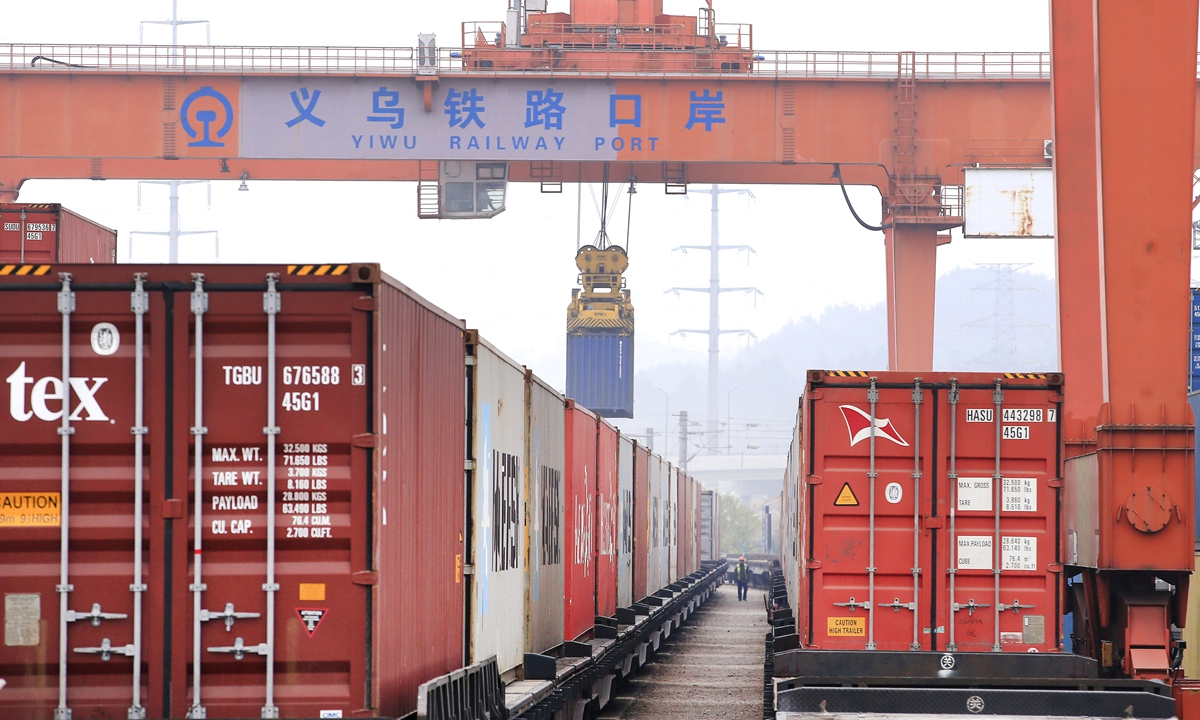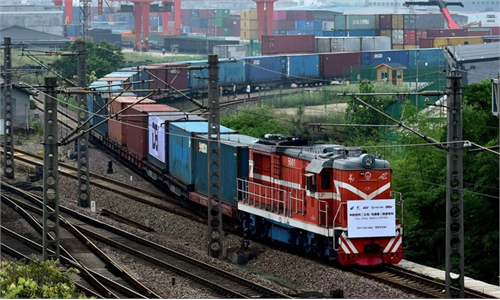SOURCE / INDUSTRIES
Reporter’s diary: Yiwu vendors see blessing in disguise despite hardships

A machine lifts goods transported via China-Europe freight train at the Yiwu Port in East China's Zhejiang Province on December 10. Photo: Yang Hui/GT
China's foreign trade has grown against global trend, becoming a driving force for the world economy with booming orders from overseas despite the COVID-19 pandemic disruptions - we all know about that, which logically makes sense but never appeared to me in reality, until I visited Yiwu, East China's Zhejiang Province in December, the place that dubbed the "world supermarket" for small commodities for a closer inspection of how China's suppliers adapt themselves to the new change on trading businesses from inches away.
Yiwu, the barometer of the world trade, accommodates tens of thousands of vendors supplying businesses all over the world. The intensive gathering of the foreign trade businesses has made the city one of the richest ones in China.
Unlike South China's Guangdong where assembles the world factories, Yiwu is more like a middleman that connecting Chinese goods with the global market. If the city is the center for small commodities, then the city's symbolic shopping center in downtown area, the Yiwu International Trade City, is the beating heart.
While I was expecting people visiting stalls and bargaining for a deal at the Christmas booths as the holiday season came near, the center as a whole was much quieter and desolate when I arrived, with my colleagues and I quickly became the center of attention.
Unsure of what to think, I stepped into some of the empty stalls inside which I found the reason for how they have managed to keep growing throughout 2020.
As the COVID-19 continues to spread across the globe, Yiwu vendors have long adjusted their tone toward e-commerce. In several stalls that I visited, vendors were sitting in front of computers actively expanding their customer base, selling directly to foreign customers via livestreaming on Facebook. Before the coronavirus outbreak, they had been busily talking with dozens of visiting clients and now they can sit in front of computers and reach out to even more.
In order to enable local businesses to get on the e-commerce express faster, the center has launched a website Chinagoods.com to help them provide one-stop cross-border logistics service, online exhibition and market information updates to international customers. Although the platform has just started in October, up to 70,000 vendors have already registered on it and some overseas customers have already started using the platform.
To reach a wider range of customers, local vendors are learning French, Spanish in addition to English so that they can expand business into African and South American markets. Relying on snippets of text, gestures and product displays in front of their webcam, some had managed to get orders from clients that they never met.
Some vendors told me that because there were few foreign customers able to visit the city this year, Yiwu vendors had put more attention on products displays in the form of quality videos and photos on Amazon and eBay.
"So, basically there's no color difference compared to the real thing. The quality of our products is also very good, the customer felt good after receiving the sample before placing the orders," a business owner of home appliance surnamed Huang told me, who together with her two employees were each holding a laptop busily interacting with their clients abroad.
The changing nature of their work now even enabled them to have more flexible time. Instead of having no time for lunch at ordinary days, they are now able to nap after lunch.
Embracing cross-border e-commerce, businesses here saw a strong rebound with some even achieved growth up to 170 percent year-on-year, the trend is particularly visible for those in grocery and home appliance businesses with people spending more time at home amid the pandemic.
Then I saw the bustle scene at the city's west railway station, the terminal of China-Europe freight trains, which echoed the booming orders. Local customs officials told me that because of the cross-border e-commerce, the goods dispatched from here abroad had been rising at an unprecedented magnitude.
Around 120 cross-border freight trains were dispatched per month from Yiwu to Europe, which means 3-4 trains per day, while it used to be just one in a day or as few as one every other day.



